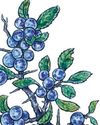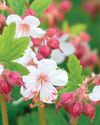IN 1976, Rosemary and John Nicholson visited the graveyard of the church of St Maryat-Lambeth to see the tomb of the John Tradescants, celebrated 17th-century gardeners, explorers and antiquaries. They found a sarcophagus carved with fantastic evocations of the distant lands where the father and son travelled in search of plants for our gardens and exhibits for their Ark in Lambeth: England’s first museum to be opened to the public.

Nearby stood the tomb of another collector of exotics, William Bligh, surmounted by a sculpture of breadfruit, saplings of which he was endeavouring to transport from Tahiti to the Caribbean on HMS Bounty when his crew decided otherwise.
Here were two profoundly significant relics of our horticultural past and yet they were overgrown, neglected. Still more dismaying, the church, whose roots in this Thames-side site antedated the Norman Conquest, had been decommissioned, allowed to fall derelict and doomed to demolition. The Nicholsons determined on a course of campaigning and funding appeals that succeeded in saving St Mary’s and enabling them to convert it into the world’s first museum of garden history.
Esta historia es de la edición Decenber 06, 2017 de Country Life UK.
Comience su prueba gratuita de Magzter GOLD de 7 días para acceder a miles de historias premium seleccionadas y a más de 9,000 revistas y periódicos.
Ya eres suscriptor ? Conectar
Esta historia es de la edición Decenber 06, 2017 de Country Life UK.
Comience su prueba gratuita de Magzter GOLD de 7 días para acceder a miles de historias premium seleccionadas y a más de 9,000 revistas y periódicos.
Ya eres suscriptor? Conectar

Kitchen garden cook - Apples
'Sweet and crisp, apples are the epitome of autumn flavour'

The original Mr Rochester
Three classic houses in North Yorkshire have come to the market; the owner of one inspired Charlotte Brontë to write Jane Eyre

Get it write
Desks, once akin to instruments of torture for scribes, have become cherished repositories of memories and secrets. Matthew Dennison charts their evolution

'Sloes hath ben my food'
A possible paint for the Picts and a definite culprit in tea fraud, the cheek-suckingly sour sloe's spiritual home is indisputably in gin, says John Wright

Souvenirs of greatness
FOR many years, some large boxes have been stored and forgotten in the dark recesses of the garage. Unpacked last week, the contents turned out to be pots: some, perhaps, nearing a century old—dense terracotta, of interesting provenance.

Plants for plants' sake
The garden at Hergest Croft, Herefordshire The home of Edward Banks The Banks family is synonymous with an extraordinary collection of trees and shrubs, many of which are presents from distinguished friends, garnered over two centuries. Be prepared to be amazed, says Charles Quest-Ritson

Capturing the castle
Seventy years after Christian Dior’s last fashion show in Scotland, the brand returned under creative director Maria Grazia Chiuri for a celebratory event honouring local craftsmanship, the beauty of the land and the Auld Alliance, explains Kim Parker

Nature's own cathedral
Our tallest native tree 'most lovely of all', the stately beech creates a shaded environment that few plants can survive. John Lewis-Stempel ventures into the enchanted woods

All that money could buy
A new book explores the lost riches of London's grand houses. Its author, Steven Brindle, looks at the residences of plutocrats built by the nouveaux riches of the late-Victorian and Edwardian ages

In with the old
Diamonds are meant to sparkle in candlelight, but many now gather dust in jewellery boxes. To wear them today, we may need to reimagine them, as Hetty Lintell discovers with her grandmother's jewellery